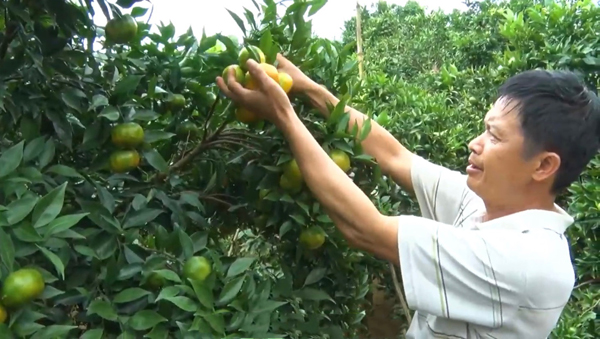
(HBO) - A project on boosting connectivity in the sale of the Nam Son tangerine has been carried out in Van Son commune since the beginning of 2019. Stakeholders in the connections have benefited from packaging and financial assistance to introduce their specialty at festivals and fairs. The participating households have also received training and guidance in the application of VietGAP and food safety standards, as well as support in tracking label usage, trade promotion and advertising.
 A
farmer in Van Son commune of Tan Lac district harvests the Nam Son tangerine
grown in the 2019 – 2020 crop. The variety has proved profitable.
A
farmer in Van Son commune of Tan Lac district harvests the Nam Son tangerine
grown in the 2019 – 2020 crop. The variety has proved profitable.
Developing the Nam Son tangerine production under
value chains has helped created a stable market, raise farmers’ income, and
supply safe and high-quality fruits for consumers. Locals’ intensive farming
skills have also been improved thanks to training in sci-tech application and
application of VietGAP standards, thereby promoting safe agricultural practices
and local farm produce’s competitiveness.
Besides, the project has been implemented on the
tangerine area that is bearing fruit, which did not change the status of land
and water resources or pollute the environment.
Recognised as a collective trademark by the
Intellectual Property Office of Vietnam (the Ministry of Science and
Technology) and meeting VietGAP standards, the Nam Son tangerine has gained an
increasingly firm foothold and won over consumers’ trust.
Farmers’ awareness has been gradually improved,
leading to more application of sci-tech advances to cultivation. Parties
involved in the project have also fulfilled their roles in product marketing.
As a result, the tangerine has secured stable sales and had its standing raised
in agricultural production. Buyers of the Nam Son tangerine are mostly from
Thai Nguyen, Son La, Ha Noi and Thanh Hoa.
The project has been implemented at a total cost
of 815 million VND (nearly 35,000 USD). With an output of 20 tonnes per ha and
prices of 20,000 – 30,000 VND per kg of fruit, farming households now earn an
average income of 300 – 350 million VND per ha, which is expected to reach 400
– 450 million VND per ha this year./.
Since the beginning of this year, under the direction of the Department of Agriculture and Environment, the Sub-Department of Agricultural, Forestry, and Fishery Product Quality Management has strengthened the integration of the professional activities to promote and guide the organizations and individuals in the production and trading of agricultural, forestry, and fishery products to comply with the legal regulations regarding the use of chemicals, pesticides and veterinary medicines in crop cultivation, livestock farming and aquaculture. They also provide guidance to processing and manufacturing establishments on keeping the records to trace the product origins and using food additives from the approved list according to the regulations.
Hoa Binh province saw a significant rise in state budget revenue in the first two months of 2025, heard a meeting chaired by Vice Chairman of the provincial People’s Committee Quach Tat Liem.
Ha Thi Ha Chi, a 26-year-old graduate in law, has taken an unconventional path by returning to her hometown in Mai Chau district to establish the Tong Dau Cooperative, creating stable jobs for local women and bringing Thai ethnic brocade weaving to the global market.
As the Lunar New Year 2025 approached, pork prices surged, creating a profitable season for farmers in Tan Vinh commune, Luong Son district. Taking advantage of the rising demand, Can Minh Son, a farmer from Coi hamlet, sold over 30 pigs at 69,000 VND/kg, each weighing more than 100 kg. After deducting expenses, his family earned a profit of over 50 million VND.
alternate member of the Central Party Committee, Secretary of the Hoa Binh provincial Party Committee Nguyen Phi Long on March 5 had a working session with Yan Jiehe, Founder and Chairman of the China Pacific Construction Group, one of China's largest private corporations in the field of transport infrastructure. Deputy Secretary of the provincial Party Committee, Chairman of the provincial People's Committee Bui Duc Hinh and leaders of provincial departments and sectors also attended the working session.
The electronic printed circuit board (PCB) manufacturing and processing plant of Japan’s Meiko Group, located at Da River Left Bank Industrial Park in Hoa Binh city with a total investment of over 200 million USD, is expected to create thousands of jobs and make a significant contribution to the local budget.



 A
farmer in Van Son commune of Tan Lac district harvests the Nam Son tangerine
grown in the 2019 – 2020 crop. The variety has proved profitable.
A
farmer in Van Son commune of Tan Lac district harvests the Nam Son tangerine
grown in the 2019 – 2020 crop. The variety has proved profitable.